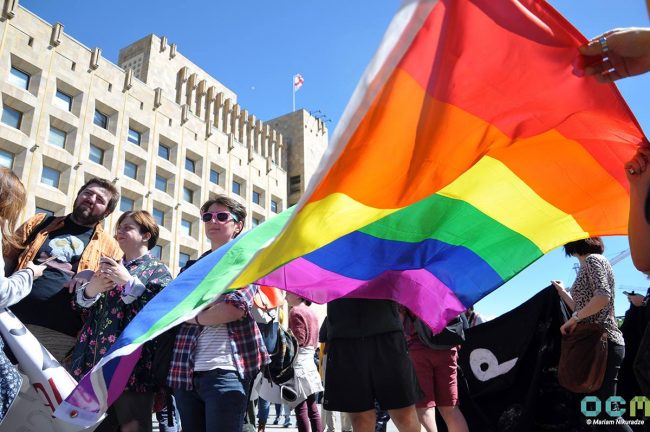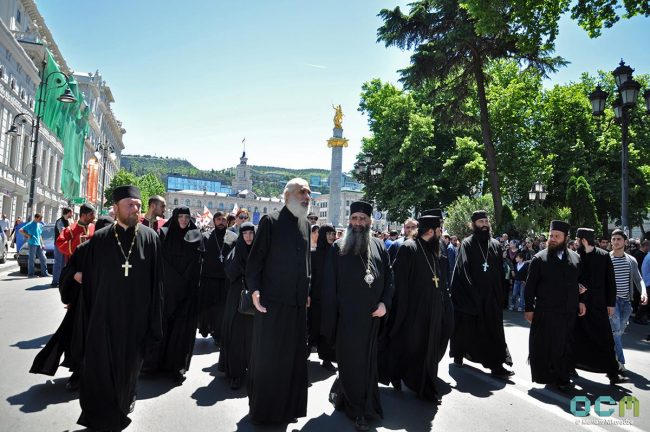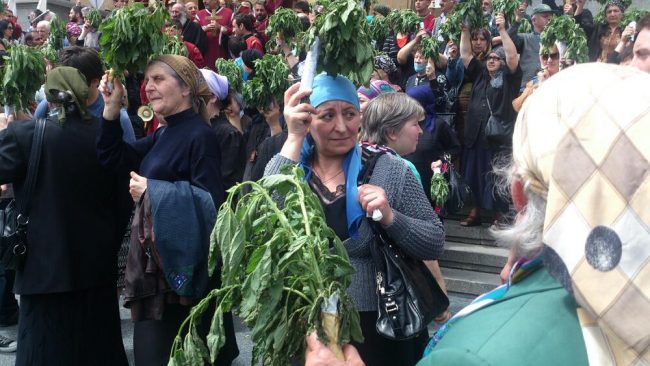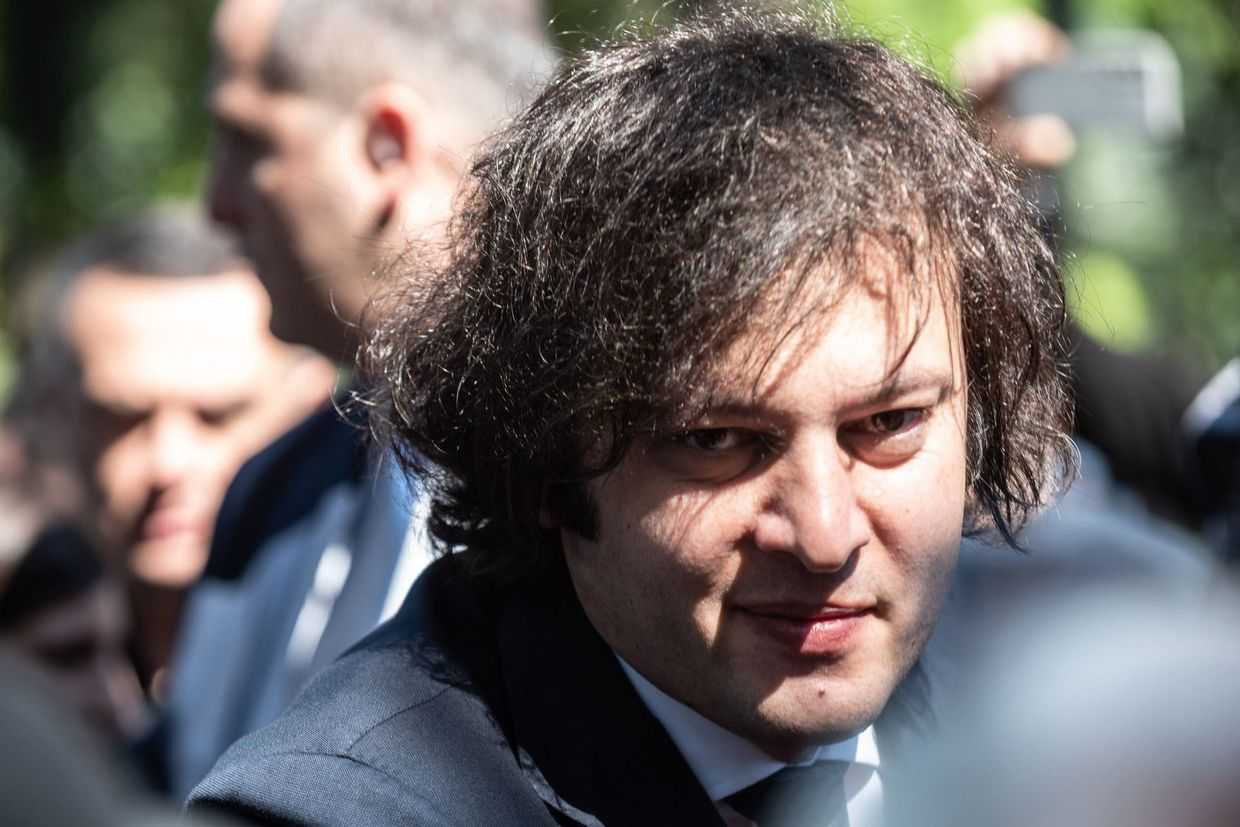Queer rights activists cancel Tbilisi 17 May demonstration after ‘threats from far-right groups’


 Queer rights group the Equality Movement has announced they will not mark the International Day Against Homophobia, Transphobia, and Biphobia on 17 May, citing security concerns. The decision comes after far-right groups organised large homophobic rallies on 12–13 May and threatened violence against anyone coming out to support queer people.
Queer rights group the Equality Movement has announced they will not mark the International Day Against Homophobia, Transphobia, and Biphobia on 17 May, citing security concerns. The decision comes after far-right groups organised large homophobic rallies on 12–13 May and threatened violence against anyone coming out to support queer people.
Despite the cancellation, some activists have vowed they will still go to the Government’s Chancellery Building on Thursday, where the demonstration was initially planned to take place. Giorgi Tabagari from the Equality Movement told OC Media he supports organisation’s decision to cancel the event, but that he will independently go to the Government’s Chancellery to mark the day. He said he had spoken with up to 10 friends who also plan to attend the ‘self-organised demonstration’.
[Read more about the 12–13 rallies on OC Media: Interior minister apologises over Tbilisi nightclub raids as far-right groups plan daily protests]
‘Considering the real threats, we, the LGBT activists, made a very hard, mutual decision to give up our constitutional right to self-expression at this time and cancel the peaceful demonstration which was supposed to take place on 17 May at the Chancellery of the Georgian Government, in order not to support interested forces in making any disorder’, the statement from the Equality Movement said.
The decision was made despite guarantees from officials to protect their right to gather. According to the Interior Ministry, police were ready to guarantee ‘maximum protection for demonstration participants’. Despite this, the activists said there was ‘an unprecedented mobilisation of hostile groups’, who they believe are getting ready for ‘unrest and civil confrontation’.
They said the government had ‘five years to resolve the homophobic and unequal social environment had they had such will’. Five years ago, on 17 May 2013, priests led thousands of conservative demonstrators in attacking several dozen queer activists. Instead, they say, there is an ‘unprecedented mobilisation’ of groups who ‘pose a great threat to the country’s statehood’. Instead, they say, there was an an ‘unprecedented mobilisation from the Patriarchate and fascist groupings’, which ‘pose a great threat to the country’s statehood’.
The activists said officials had engaged in a ‘constant effort to incite hatred’, instead of addressing problems such as unemployment, poverty, and others.
[Read stories from around the South Caucasus on OC Media: Forced from home for being queer]
Several conservative groups announced they would march on 17 May to celebrate ‘Family Purity Day’, a celebration initiated by the Georgian Orthodox Church in 2014, a year after the violence in the centre of Tbilisi.
Since then, the Church has celebrated the day annually, organising massive marches carrying religious icons. On Tuesday, the Church announced the march would take place as usual, but distanced themselves from ‘aggressive’ far-right groups and condemned violence.
Several priests attended this weeks violent far-right rallies, in which demonstrators tried to break police lines, throwing rocks at police, with some groups giving Nazi salutes and chanting ‘death to the enemy’. Organisers of the rally said they were fighting ‘against drug dealers and LGBT propagandists’.
Far-right counter-rally gathered near 9 April Square after being prevented by police from going to the parliament where #Bassiani #CafeGallery protest is being held #Tbilisi pic.twitter.com/AQylLaTIts
— OC Media (@OCMediaorg) May 13, 2018
Far-right threat
A number of far-right groups had pledged to hold their own rallies on 17 May. The March of Georgians, a conservative ultranationalist group, said that they will now no longer hold their planned rallies on Thursday. The group’s leader, Sandro Bregadze told Interpressnews that 17 May will go on ‘as it should’ — by people going to pray in churches and joining events planned by the Church.
‘We have no intention that someone benefit from our domestic confrontation’, he remarked.
Neo-Nazi group the the Nationalist Socialist Movement — National Unity of Georgia, one of the organisers of this week’s far-right rallies, had also pledged to march down the city’s central Rustaveli Avenue.
‘Family Purity Day’

In 2013, a small group of around 50 queer rights activists were confronted in Tbilisi by thousands of counter-demonstrators led by Georgian Orthodox priests. Demonstrators carried posters with homophobic messages such as: ‘We don’t need Sodom and Gomorrah in Georgia’.
The crowds, some carrying nettles to beat queer rights activists with, broke through police lines to attack the activists. Police were forced to evacuate the small number of activists from the city centre to avoid further violence.
Last year, the Church held a counter-rally from Tbilisi’s central Rustaveli Avenue to Sameba Cathedral in support of ‘family values’. The rally was attended by several thousand people.
International Day Against Homophobia is observed annually in more than 120 countries on 17 May. The date was chosen to commemorate the World Health Organisation’s decision in 1990 to remove homosexuality from the International Classification of Diseases.

Homophobic violence in Georgia
In 2017, the Prosecutor’s Office examined 86 alleged hate crimes, 12 of which were based on sexual orientation and 37 on gender identity.
The Public Defender’s 2018 report said violence against queer people, whether in the family or in public spaces, is a serious problem, and that the government has been unable to respond to this challenge.
The report said the Public Defender received numerous complaints regarding homophobic attitudes from law enforcement officials.
‘In some cases, complainants withdrew cases and refused to cooperate with the general inspection or the Prosecutor’s Office because they didn’t believe an investigation into their cases would be timely’, the report reads.
The report said transgender women in particular often appeal to the Public Defender’s Office about violence they face.
‘Unfortunately, law enforcement officials don’t have an efficient strategy against hate motivated violence. They react to individual cases and don’t take action against the systematic problem’, the report reads.







